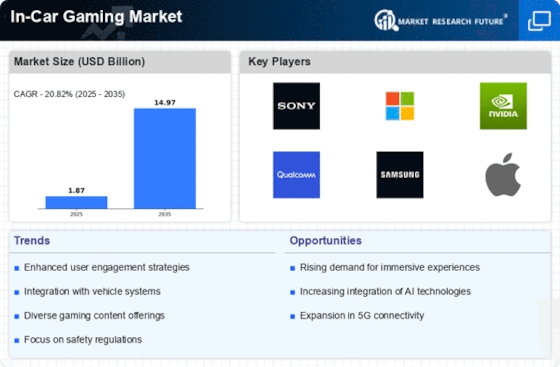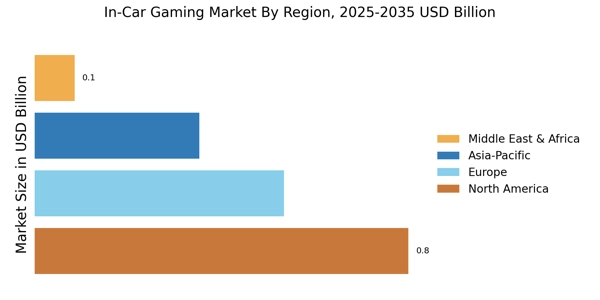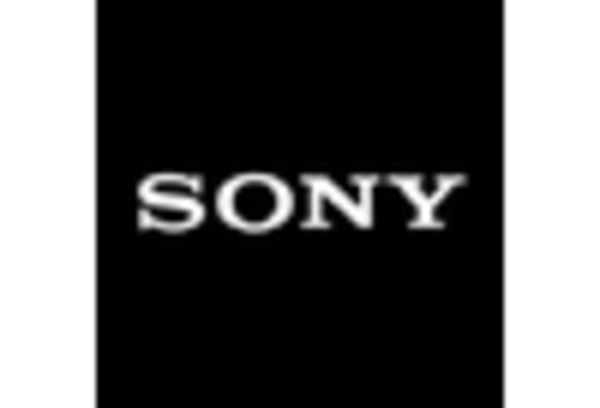Rise of Electric Vehicles
The increasing adoption of electric vehicles (EVs) appears to be a pivotal driver for the In-Car Gaming Market. As more consumers opt for EVs, manufacturers are integrating advanced infotainment systems that support gaming applications. In fact, the EV market is projected to grow at a compound annual growth rate (CAGR) of over 20% in the coming years. This growth is likely to enhance the demand for in-car entertainment options, including gaming, as consumers seek to maximize their time spent in vehicles. Furthermore, the extended battery life of EVs allows for longer gaming sessions, making it a compelling feature for families and tech-savvy individuals alike. The In-Car Gaming Market is thus positioned to benefit from this trend, as automakers increasingly prioritize entertainment features to attract buyers.
Enhanced Connectivity Solutions
The proliferation of high-speed internet and 5G technology is transforming the In-Car Gaming Market. Enhanced connectivity solutions enable seamless online gaming experiences, allowing passengers to engage in multiplayer games while on the move. As of 2025, it is estimated that 5G networks will cover a significant portion of urban areas, facilitating real-time gaming interactions. This connectivity not only enhances the gaming experience but also opens avenues for cloud gaming services, which require robust internet access. Consequently, the In-Car Gaming Market is likely to see a surge in demand for games that leverage these advanced connectivity features, appealing to a tech-savvy demographic that values high-quality entertainment during travel.
Shift Towards Autonomous Vehicles
The anticipated shift towards autonomous vehicles is poised to significantly impact the In-Car Gaming Market. As vehicles become more automated, the role of the driver diminishes, allowing passengers to engage in various activities, including gaming. This transition is expected to create a new market segment where gaming becomes a primary form of entertainment during travel. Industry forecasts suggest that by 2030, a substantial percentage of vehicles on the road will feature some level of automation. This shift not only enhances the appeal of in-car gaming but also encourages developers to create games specifically designed for use in autonomous settings. The In-Car Gaming Market is thus likely to experience growth as it adapts to the evolving landscape of transportation.
Growing Demand for In-Car Entertainment
The rising consumer demand for in-car entertainment options is a notable driver for the In-Car Gaming Market. As individuals spend more time commuting, there is an increasing desire for engaging activities that can alleviate boredom. Market Research Future indicates that nearly 70% of consumers express interest in gaming as a form of entertainment during travel. This trend is particularly pronounced among younger demographics, who are more inclined to seek interactive experiences. Automakers are responding by incorporating gaming platforms into their infotainment systems, thereby enhancing the overall driving experience. The In-Car Gaming Market is thus likely to expand as manufacturers recognize the potential for gaming to attract and retain customers.
Increased Focus on Family-Friendly Content
The growing emphasis on family-friendly content is emerging as a key driver for the In-Car Gaming Market. As families increasingly use vehicles for travel, there is a heightened demand for games that cater to all age groups. Developers are responding by creating content that is not only entertaining but also educational, appealing to parents who prioritize safe and constructive entertainment for their children. Market analysis indicates that family-oriented games are gaining traction, with a notable increase in downloads and user engagement. This trend suggests that the In-Car Gaming Market will continue to evolve, focusing on content that fosters family interaction and engagement during travel, thereby enhancing the overall in-car experience.

















